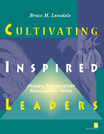BOOKS
Cultivating Inspired Leaders: Making Participatory Management WorkBruce Lansdale Bruce Lansdale draws on the wealth of experience that he gained during his years at the American Farm School to show how managers can progress from their traditional roles as administrators to become inspired leaders with the capability and eagerness to cultivate leadership qualities—as well as a sense of dedication and commitment to their organizations and their associates—in More > |  |
Cultural Expression and Grassroots Development: Cases from Latin America and theCaribbeanCharles David Kleymeyer, editor Arguing that a people's own cultural heritage is the foundation on which equitable and sustainable development can best be built, this book presents an innovative, culture-based approach to grassroots development in Latin America and the Caribbean. The approach seeks to retain a population's special cultural strengths and contributions while enabling them to achieve necessary changes in More > |  |
Culture, Development, and Public Administration in AfricaOgwo Jombo Umeh and Greg Andranovich Using southern African nations as an example, the authors argue that emerging societies are poor today thanks to the over reliance on non-local models. Practitioners must consider local cultures—-languages, symbols, customs, and rituals—in developing effective administrative practices. They must absorb the experiences of people who know first-hand the dynamics and conditions in these More > |  |
Curtailing Corruption: People Power for Accountability and JusticeShaazka Beyerle How do citizens counter corruption and exact accountability from power holders? What strategic value does people power bring to the anticorruption struggle? Can bottom-up, citizen-based strategies complement and reinforce top-down anticorruption efforts? Addressing these questions—and demonstrating the critical role of grassroots efforts in the anticorruption/accountability More > |  |
Cyber Intelligence: Actors, Policies, and PracticesConstance S. Uthoff US national security compromised by Wikileaks. Towns held hostage by ransomware. Corporate websites hacked. Cyber espionage and cybercrimes are increasing in both frequency and sophistication—requiring the collection of actionable intelligence in order to combat them. Constance Uthoff provides a comprehensive overview of cyber intelligence, explaining what it is, why it is needed, who is More > |  |
Damascus Diary: An Inside Account of Hafez al-Assad's Peace Diplomacy, 1990-2000Bouthaina Shaaban, with a foreword by Fred Lawson Bouthaina Shaaban worked closely with Syria's president Hafez al-Assad from 1990 until the time of his death, serving as both official interpreter and adviser. Her new book, part memoir and part historical account, takes the reader behind the closed doors of the Syrian Presidential Palace to provide uniquely Syrian perceptions of the failed Arab-Israel peace talks. Sharing firsthand stories More > |  |
Dangerous Men: The Sociology of Parole, 2nd EditionRichard McCleary What happens when a prison inmate gets out on parole? What factors determine who stays out of prison—and whose paroles get revoked? In this classic participant-observer study of the parole bureaucracy, Richard McCleary focuses on the interactions between parole officers and parolees; between parole officers and parolees; between parole officers and their colleagues (and superiors); and on More > |
Daughters of Sarah: Anthology of Jewish Women Writing in FrenchEva Martin Sartori and Madeleine Cottenet-Hage, editors National Jewish Book Awards Finalist! The editors have gathered a treasure trove of excerpts (some translated into English for the first time) from a variety of genres—novels, short stories, letters, plays, poetry, autobiographies—to showcase the work of both well-known and less familiar French Jewish women writers from the mid-nineteenth century to the present. The collection More > |  |
Days of Dust [a novel]Halim Barakat, translated by Trevor Le Gassickwith an introduction by Edward Said Focusing on the interaction of finely portrayed characters from all elements of society, Days of Dust depicts the existential drama of the Six Days War as it was experienced on a personal level. The novel provides a remarkable perspective for comprehending Palestinian uprootedness and a people’s unceasing struggle for a homeland. First published in Arabic in 1969. This edition includes More > | ![Days of Dust [a novel]](/uploads/t66f5e19572806.jpg) |
Death in Beirut [a novel]Tawfiq Yusuf Awwad, translated by Leslie McLoughlin Set against the background of post-1967 Lebanon, this novel caused a sensation in the Arab world because of its frank and realistic descriptions of Lebanon's—and particularly Lebanese women's—problems. Tragedy awaits Tamina, who is drawn by the lure of the city to leave her Shia Muslim village for the university in Beirut. Injured in a student demonstration, she is rescued by More > | ![Death in Beirut [a novel]](/uploads/t66f5953fcff86.jpg) |







